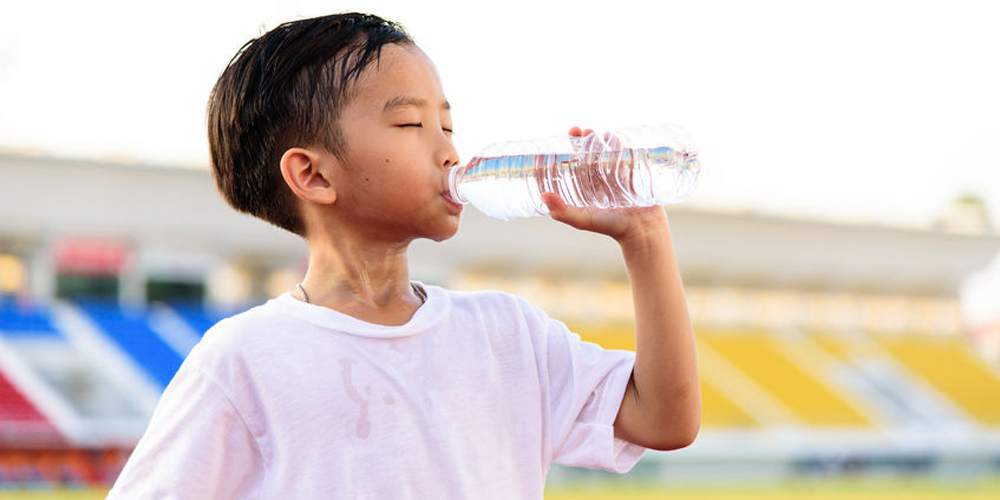You are at work, and you reach for a cool drink of water. Your kids are at school and they grab the water you packed for them. You are at a local lunch counter and you ask for a water to go with your salad. You are at home and you toss your kids a water as they run out the door. You feel like a good parent, providing healthy options for your kids. You feel like you are doing your body right, because you are hydrating without adding calories. You are drinking something purified. Something untainted.
Bottled water has become so intertwined in our day. People rarely go to the water fountain, when there is a vending machine nearby. Families stock water bottles in their fridge as their primary go-to drink. In fact, the Washington Post reported that the average American is reported to consume over 35 gallons of bottled water each year, or 270 bottles.
So what does this have to do with teeth? Why is my dentist telling me to stop drinking bottled water? How bad can bottled water be, when it offers so many great benefits to my health and life? Well, bottled water isn’t quite the positive drink option it seems.
Fluoride in Bottled Water
We are fortunate to live in a country that adds the chemical Fluoride to our drinking water. Since 1951, the United States has made it policy to add Fluoride to all public water, in an effort to decrease tooth decay. The idea is that people will drink the water and while drinking the water, the chemical will bind to their teeth and offer a level of protection. The US government reports that the cost of this process is $1.06 per person, per year (or less than the average price of one bottled water at $1.21)
The fluoride works by creating a barrier between the teeth and the acids in our foods. It locks out these acids that would otherwise corrode teeth and create cavities. Fluoride has even been naturally found in some of our favorite foods, including black tea, white wine, some seafood, and potatoes.
But all this helpful fluoride won’t reach your or your children’s teeth if you are drinking bottled water. By selecting bottled water as your hydration choice, you are omitting this valuable chemical from your diet, and potentially putting your teeth at a great disadvantage. The American Dental Association (ADA) recommends ingesting 4mg of fluoride every day, but bottled water only contains 0.11mg per liter (USDA 2005), compared to the average 1.1mg per liter of tap water. So you would have to drink over 36 liters of bottled of water every day to get the recommended dosage.
A few bottled water companies sell fluoridated water that are at or exceed the recommended fluoride dosage of 0.11ppm. These include: Perrier (0.31ppm), Crystal Geyser (0.24ppm), Naya (0.14ppm), Dannon (0.11ppm), and Evian (0.10ppm) as per the USDA 2005 study. These would offer better tooth enamel protection through dental surface exposure.
Acidic pH in Bottled Water
So if you choose a bottle water that contains fluoride, are you good? Not quite. Many bottled waters also test poorly on the pH scale, showing they are acidic to teeth and can cause damage over time.
The pH scale is a range of acidic to alkaline chemicals, with pure water at the center with a 7.0 score. If a substance is too acidic or too alkaline, it will damage and corrode surfaces it comes in contact with… including teeth. Naturally occurring groundwater usually tests at levels between 6.0 and 8.5 indicating that it is not harmful to teeth or our bodies. Studies have shown that at a pH of 5.5, the teeth begin to break down, forming cavities and showing general decay. But some bottled water can test as low as 3.6 making them as acidic as grapefruit (3.0-3.7)!
The most acidic brands include Propel Fitness Water (3.6), Penta (4.0), Dasani (4.5), Perrier (5.5), and Poland Spring (5.8). Consuming water at these acidic levels can create an environment of decay and harm your teeth over time. Tap water, on the other hand, offers a healthy balanced level that hydrates without corroding.
So, what healthy and refreshing alternatives are there to bottled water?
You don’t have to reach for a soda or tea, avoiding tap water all together. You just need to invest some time and thought into refillable water bottles and bring your tap water to-go. Refillable bottles can be machine washable, can seal as well as standard water bottles, and can save you money. They are readily available online, at your local grocer next to plastic wrap and aluminum foil, and at all major box stores. Buying a pack of 6, filling them, and keeping them in the fridge is a great way to make tap water as convenient and refreshing as your bottled option.
When you are unable to bring your own bottle around, stick with the tap. Restaurants, coffee shops, and lunch shops offer cold tap water for free if you ask. Water fountains can be found at all local gyms. And if you do have your bottle, but it is empty, these spaces are often happy to refill your water bottle, without charge. Imagine the savings to your wallet, and the environment.
Additionally, you should check if your toothpaste contains fluoride. Many “natural” toothpastes have both fluoride and fluoride-free options, so check the label before you buy the wrong one. And next time you come in for a dental visit, make sure you add a fluoride sealant treatment. This treatment is fast, pain-free, and protects you for weeks and months beyond your visit. A fluoride sealant treatment involves applying a thin layer of fluoride directly to the tooth, in a way similar to painting. Once dry, the fluoride layer offers enhanced protection from decay and decreasing the likelihood of future cavities.

